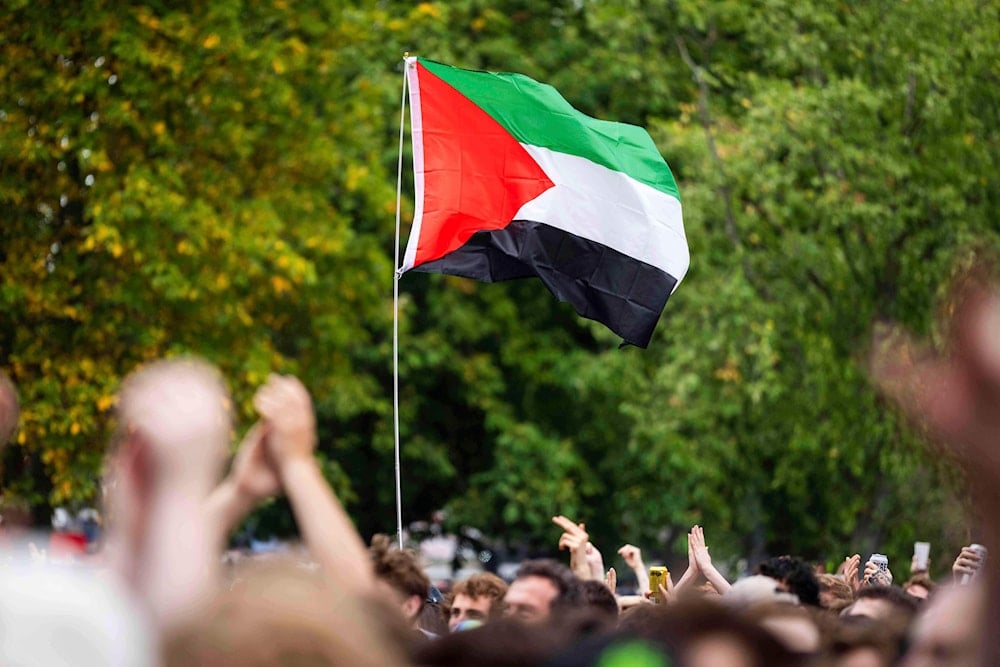'Israel' risks growing isolation as war on Gaza persists: Bloomberg
Israeli Prime Minister Benjamin Netanyahu orders a new Israeli ground operation in Gaza, ignoring both military advice and international pressure.
-

The flag of Palestine is waved in a crowd as the hip hop trio Kneecap perform in Finsbury Park on July 5, 2025, in London. (Photo by Scott A. Garfitt/Invision/AP)
Israeli Prime Minister Benjamin Netanyahu has responded to months of domestic and international criticism over the war on Gaza by ordering a renewed Israeli ground operation in Gaza, deepening concerns about "Israel’s" long-term security and diplomatic standing.
According to Bloomberg columnist Marc Champion, "Israel" enjoyed global sympathy after the Palestinian resistance's October 7 operation in 2023. But since then, the devastation in Gaza, with tens of thousands of civilians killed and food and medicine restricted, has eroded international support.
Allegations of genocide are under investigation by the International Court of Justice, and some of "Israel’s" closest allies have moved toward recognizing a Palestinian state.
Defying the advice of Chief of the General Staff Eyal Zamir, Netanyahu ordered the capture of Gaza City as part of a broader offensive, insisting that the occupation will be temporary, with Arab forces eventually replacing Israeli troops once Hamas is dismantled. Yet the operation lacks a clear exit strategy and does not meet the conditions Arab nations have set for their involvement.
The plan has few supporters. Champion mentioned that hostage families fear it could endanger their loved ones, while allies warn of dire humanitarian consequences, adding that even far-right Finance Minister Bezalel Smotrich criticized the strategy for not entirely ruling out negotiations with Hamas.
He argued that "Israel’s" continued reliance on military force in the region, against Palestinians, Lebanon, Syria, and Iran, has strained ties with allies in the Middle East, Europe, and even the US. Germany has suspended certain arms exports that could be used in Gaza, and Washington has begun signaling discomfort with "Israel’s" prolonged campaign.
Former Prime Minister Ehud Olmert warned that without US and allied assistance, "Israel" would have struggled to defend itself from Iranian ballistic missile attacks earlier this year.
Political pressures driving the war
Netanyahu’s coalition partners, including National Security Minister Itamar Ben-Gvir and Smotrich, have threatened to collapse the government if troops withdraw from Gaza. Both openly support the "voluntary" departure of Palestinians from the enclave, a policy critics call ethnic cleansing.
Netanyahu’s opposition to a Palestinian state is longstanding, rooted in both political strategy and personal ideology. His critics say his approach, undermining the Palestinian Authority while allowing Hamas to control Gaza, collapsed with the October 7 operation, yet he still rejects proposals for the Palestinian Authority to play a role in post-war governance.
The report adds that a group of more than 550 former Israeli generals and intelligence chiefs has appealed to US President Donald Trump to pressure Netanyahu into ending the war and allowing humanitarian aid into Gaza. Regional powers, including Saudi Arabia, Egypt, and the UAE, have tied their assistance for Gaza’s reconstruction to a two-state solution and the removal of extremist policies from Netanyahu’s government.
However, analysts argue that without US intervention, the current policy trajectory will entrench "Israel" in an indefinite conflict, eroding its security and global standing.

 3 Min Read
3 Min Read








